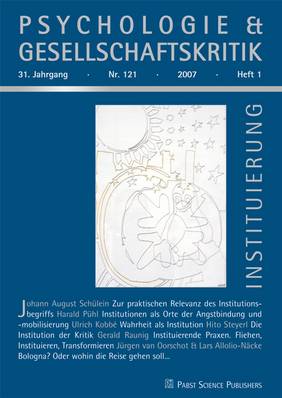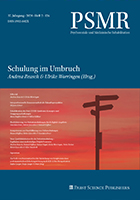Editorial
Johann August Schülein
Zur praktischen Relevanz des Institutionsbegriffs
Zusammenfassung | Abstract
Harald Pühl
Institutionen als Orte der Angstbindung und -mobilisierung
Zusammenfassung | Abstract
Ulrich Kobbé
Wahrheit als Institution
Zusammenfassung | Abstract
Hito Steyerl
Die Institution der Kritik
Zusammenfassung | Abstract
Gerald Raunig
Instituierende Praxen. Fliehen, Instituieren, Transformieren
Zusammenfassung | Abstract
Jürgen van Oorschot & Lars Allolio-Näcke
Bologna? Oder: Wohin die Reise gehen soll
Zusammenfassung | Abstract
Katrin Kinsler
»Bitte nicht - danke nein«
Zur praktischen Relevanz des Institutionsbegriffs
Johann August Schülein
Auf dem Hintergrund der allgemeinen Schwierigkeiten sozialwissenschaftlicher Theorie, ihren (vielschichtigen, widersprüchlichen, dynamischen) Gegenstand zu erfassen, wird versucht, eine allgemeine Konzeption des Institutionsbegriffs zu umreißen. Dabei werden Institutionen als stabile Relationen in einem dynamischen Kontext gesehen, wobei die Hervorhebung als Institution auch von der Bezugsperspektive abhängig ist. In der Folge werden Phasen des Institutionalisierungsprozesses, das Funktionsniveau von Institutionen, ihr produktiver und reproduktiver Prozess, Formen und Typen ihres Operierens und themenspezifische Aspekte ihrer Praxis diskutiert.
Schlüsselbegriffe: Institution, Institutionstheorie, Institutionsanalyse, Institutionsentwicklung
About the relevance of the concept of institution
After a short look at the principal difficulties of social sciences focussing a contradictory, changing and moving target, the article tries to develop a general concept of institutions. Institutions are defined as stable relations in a dynamic context. What is emphasized as institution depends to a certain degree on the frame of reference. Following this, certain aspects of institutions are analyzed: the process of institutionalization, the level of functioning, productive and reproductive functions, forms and types of operating and the effect of topics on institutions.
Key words: institution, theory of institutionalization, institutional analysis, institutional development
Prof. Dr. Schülein, Johann August
Institut für Soziologie und Empirische Sozialforschung
Wirtschaftsuniversität Wien
Augasse 2-6
A-1090 Wien
Institutionen als Orte der Angstbindung und -mobilisierung
Harald Pühl
Ausgehend von meiner bekannten These, dass Angstbindung in Institutionen wesentlich durch Strukturen gebunden wird, stelle ich unter diesem Gesichtspunkt eine idealtypische Charakterisierung von drei Organisationstypen vor. Institutionellen Mythen kommt m. E. eine herausragende Bedeutung bei der Angstbewältigung in Institutionen zu, ein Beispiel aus der Praxis wird dies veranschaulichen. Abschließend streife ich die Aggressionsthematik unter dem Aspekt der Angstverarbeitung.
Schlüsselbegriffe: Angstbindung, institutionelle Mythen, Institutionssupervision, Institutionstypen, Organisationsstruktur
Institutions as locations of fear-processing and -mobilisation
Starting with the claim that the processing of fear in institutions is covered mainly by structures, I now propose a characterization of three types of institutions. In my view, in my view institutional myths play an important part in the coping of fear, which will be illustrated by a practical example. In the end I will touch upon the notion of aggression with respect to the processing of fear.
Key words: processing of fear, institutional myths, institutional supervision, types of institutions, organizational structure
Dr. Pühl, Harald
Institut Triangel e.V.
Horstweg 35
14059 Berlin
Wahrheit als Institution
Ulrich Kobbé
Der Beitrag diskutiert Wahrheit als ein eine instituierende gesellschaftliche Institution. Im Kontext von Heiliger Veronika, wahrem Zeichen (veron ikon) und der heilpflanzlichen Veronica wird der fiktionale Charakter von Wahrheit aufgezeigt. Der Initiationsstatus des Geständnisses als das Diskursritual des Wahrsprechens (parrhesia) in der abendländischen Kultur offenbart den Fetischcharakter der eingeforderten Wahrheit. Dabei setzt Demokratie die Redefreiheit ebenso voraus, wie sie von der ausgesprochenen Wahrheit infrage gestellt wird. Skizziert wird diese Wahrheitslogik und -dialektik am historischen Beispiel des vor 30 Jahren dienstsuspendierten Psychologieprofessors Peter Brückner und seiner Haltung zur »institutionellen Umklammerung des Lebens«.
Schlüsselbegriffe: Wahrheit, Geständnis, Institution, Instituierung/Destituierung, Peter Brückner
Truth as an institution
The contribution discusses truth as an instituting social institution. The fictional character of truth will be exemplified in the contextual field of the Holy Veronica, of her sweat cloth as a veron icon, and of the medical herb Veronica. As the initiating function of confession is considered to be the occidental discursive ritual of truth-telling (parrhesia), this reveals the fetish-character of the demanded truth. Overall, democracy requires the freedom of speech as well as it turns out to be jeopardized by the told truth. By way of example, this logic and dialectic of truth will be outlined in the light of the historic case of Peter Brückner, a German professor for psychology who has been suspended from his chair at the University of Hanover 30 years ago, especially on the basis of his straight outlook in face of the »institutional embrace of existence«.
Key words: truth, confession, institution, institution/destitution, Peter Brückner
Dr. Kobbé, Ulrich
iwifo-Institut
Postfach 300125
59543 Lippstadt
Die Institution der Kritik
Hito Steyerl
Kritik kann in der Tradition neuzeitlichen Denkens verstanden werden als eine Weise politischer Subjektivierung. Diese These wird für die letzten Jahrzehnte expliziert durch die Arten der Institutionskritik im Kunstfeld, wobei Hinweise auf entsprechende Entwicklungen der kritischen Psychologien gegeben werden. Drei Phasen dieses Verhältnisses von Kritik und Kulturinstitution werden herausgearbeitet: Die Option von Räumen demokratischer Öffentlichkeit in den siebziger Jahren, der Zusammenbruch solcher Forderungen im politisch-ökonomischen Paradigmenwechsel der neunziger Jahre - Institutionskritik wird Repräsentationskritik, es sollte eine Hegemonie in der Darstellung des Anderen erkämpft werden - und aktuell der Gang in die Prekarität, die Produktion eines ambivalenten Subjekts in der Gefahr der Entortung.
Schlüsselbegriffe: Institutionskritik, Kritik als Institution, Repräsentationskritik, Heterotopie
Critique as institution
Critique may - in the tradition of modern thinking - be understood as a form of subjectivation. This argument is explained with respect to last decades, referring to the critique of institution in the field of art. Three phases of the relationship between critique and cultural institutions are presented: The possibility of democratic public space in the 1970ies, the decrease of this public claim in the political/economical paradigm change in 1990ies - the critique of institution is turned into critique of representation the aim now was to create a hegemonic representation of the other - and at present the step towards precarity, the production of the ambivalent subject in danger of delocalization.
Key words: Critique of institution, critique as institution, critique of representation, heterotrophy
Steyerl, Hito
eipcp - European Institute for Progressive Cultural Policies
Gumpendorfer Straße 63b
A-1060 Wien
Instituierende Praxen. Fliehen, Instituieren, Transformieren
Gerald Raunig
Der Text verhandelt mögliche nicht-dialektische Formen der Aktualisierung von Institutionskritik. Ausgehend von einer Kritik aktueller künstlerischer Positionen wird eine Praxis der Institutionskritik gefordert, die sich mit den gesellschaftlichen Veränderungen weiter entwickelt, vor allem auch Anschluss findet an andere Formen außerhalb des Kunstfelds, wie sie gegen die jeweiligen Verhältnisse oder auch vor deren Ausformungen entstehen. Vor dem Hintergrund eines solchen transversalen Austausches von Kritikformen, aber auch jenseits der Imagination von herrschafts- und institutionsfreien Räumen wäre Institutionskritik zugleich als kritische Haltung und als instituierende Praxis zu reformulieren. Maßgeblich dafür ist u. a. die Überschneidung und Überlagerung mehrerer Formen von parrhesia, wie sie in der griechischen Antike entwickelt und in Michel Foucaults Spätwerk theoretisch aktualisiert wurden.
Schlüsselwörter: Institutionskritik, parrhesia, instituierende Praxen
Institutionalizing practices. Escape, Institutionalize, transform
This text is about non-dialectical forms of an actualization of the critique of institutions. Emanating from a critique of current artistic positions it is challenged to perform a practice of critique of institutions emerging with changes in society affiliated to forms outside the field of arts generated against actual conditions or their implementations. On the background of such a transversal exchange of forms of critique the critique of institutions should be reformulated as well as a critical attitude as an institutionalizing practice, too - beyond any imagination of spaces free of power and institutions. Applicable amongst others is a coincidence with some forms of parrhesia developed by the ancient Greeks and theoretically actualized by Michel Foucault in his last works.
Key words: Critique of institutions, parrhesia, institutionalizing practices
Raunig, Gerald
eipcp - European Institute for Progressive Cultural Policies
Gumpendorfer Straße 63b
A-1060 Wien
Bologna? Oder: Wohin die Reise gehen soll
Jürgen van Oorschot & Lars Allolio-Näcke
Die mit dem Stichwort Bologna verbundenen Debatten zur Instituierung neuer Standards und Richtlinien in der europäischen Hochschullandschaft kranken vor allem an einem: es fehlt die Parrhesie (Freimütigkeit) des Wahrsprechen auf beiden Seiten, bei der politischen Führung als Agens einerseits und bei den an den Hochschulen beschäftigten Professoren/innen und lernenden Studierenden andererseits. Daher wird hier zunächst der Instituierungsprozess nachgezeichnet sowie seine merkantilen Implikationen für die Bildungssituation in Deutschland im Allgemeinen und für das Studium, die Forschung und die Lehre im Besonderen diskutiert. Abschließend wird explizit Stellung zur damit einhergehenden Ökonomisierung von Wissen bezogen und Alternativen werden aufgezeigt.
Schlüsselbegriffe: Bologna-Prozess, Bildung, Ökonomisierung von Wissen, Hochschulpolitik
Bologna? Or, where does this journey go to?
The crux of the debates about the so called Bologna-process that tries to institutionalize new standards and guidelines into the European academic system is the lack of parrhesia (frankness) on both sides: on the side of the politics on the one hand and on the side of the teaching staff and the learning students on the other hand. Here, we trace back the process of institutionalization of the new standards and discuss its mercantile effects on the whole educational system in Germany in general and on research and teaching in particular. Following, we take a firm stand on marketization of knowledge to the disadvantage of Bildung - and we point out alternatives.
Key words: Bologna-process, Bildung, marketization of knowledge, academic system politics
Prof. Dr. Oorschot, Jürgen van
Theologische Fakultät
Lehrstuhl für Altes Testament
Kochstr. 6
91054 Erlangen























